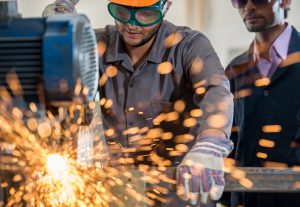
Thin sheet metal is a crucial component of almost all production processes.
Industries such as automotive and construction choose this type of metal component to make products. You’ll also see metal sheets widely used in aerospace, and even equestrian.
It’s not surprising the U.S. Bureau of Labor Statistics projected that the metal fabrication industry will grow by 9% from 2016 to 2026.
This substantial growth is not only seen in the United States, though.
On a global level, the sheet metal market continues to expand at an average growth rate of 4.09%. This growth is projected from 2018 to 2022.
All of these statistics show that thin metal strips continue to be in high demand. Let’s delve deeper as to why it continues to be the preferred component in almost every production process.
1. Wide Range of Options
There are many different alloys of sheet metal, allowing you to choose which one is best for your particular need. Sheet metal alloys come can vary from carbon steel, stainless steel, brass and copper, and aluminum.
Each of these metal compositions has its own unique properties, giving you more options without having to compromise on the qualities you need.
Most manufacturers consider these superb metal qualities when choosing an alloy for their metal sheets:
- Strength
- Rust resistance
- Aesthetics
The construction industry mostly chooses stainless steel for its strength and flexibility. The automotive industry, on the other, chooses aluminum sheets because its lightweight, perfect for manufacturing vehicles.
The wide range of options that thin sheet metals provide offers superior versatility and function in almost every manufacturing process.
2. Easy to Customize
Thin sheet metals can effectively boost the efficiency of manufacturing operations. Production rate is increased while reducing engineering errors at the same time. With customized measurements on your metal sheets, you can easily avoid design errors that riddled components that don’t match requirements.
You can request your supplier to cut your sheet metal according to a specific shape, as needed by your project. Measurements such as width and length can be customized as well. Other specifications you can request are cut-to-length and slit-to-width, making sure that they match your requirements.
Since sheet metals are already customized by the time they arrive at your production facility, there’s less overhead spent on fixing errors. Manufacturers can allocate 30 to 50% more of their time to other significant production tasks.
3. More Options to Finish Products
Thin metal strips can accommodate finishing techniques such as powder coating, brushing, abrasive sandblasting, polishing, and plating. The versatility it offers allows you to add your required finishing for aesthetic purposes. You can even finish your product so that it’s protected from corrosion.
The malleability that every thin steel sheet offers make it easy to apply on any product. You can bend it to different shapes so that it conforms to your specific product design while applying finishing techniques.
4. Thin Sheet Metal is Very Durable
While thin sheet metals can be easily cut and bend, it remains to be a durable material – thin metal strips can withstand varying weather and environmental conditions.
However, you need to choose a proper alloy depending on the conditions that the sheet metal will be exposed to. The corrosion-resistant property of stainless steel is best if you want a rust-proof material. Copper, on the other hand, is best for electrical components because of its superb conductivity.
Regardless of the specific properties you require, thin sheet metals are always durable and will enhance the lifetime of your products.
5. It Keeps the Economy Going
The benefits of using thin metal strips go beyond being a component for manufacturing products. Since it’s always in high demand in a variety of industries, sheet metals account for about $30 billion in U.S. revenue.
Did you know that in 2016, there are 138,900 U.S. sheet metal workers? Sheet metal workers are aplenty and continue to require more manpower because of the demand; creating more jobs as a result.
Ultimately, thin metal sheets not only benefit you in your production but provides thousands of jobs that help to grow and strengthen the U.S. economy.
Choose Thin Metal Strips for Your Manufacturing Operations
These five benefits give proof as to why most manufacturers from varying industries continue to use thin sheet metal components. The combination of flexibility and durability makes it applicable in a lot of products, plus they are affordable too.
